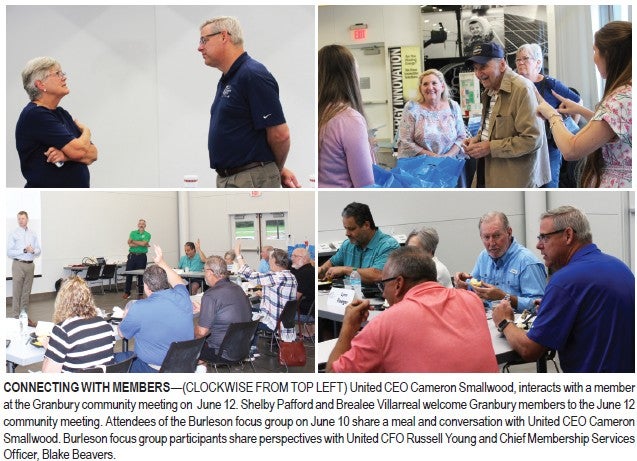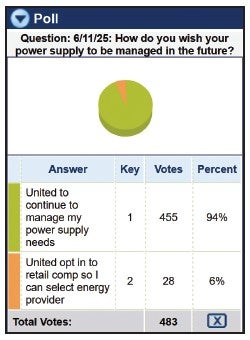United Hosts June Meetings to Hear
from Members Across the Service Territory
Despite a week of steady rain across United’s service territory, committed members braved the weather to participate in a Burleson focus group on June 10.
The luncheon kicked off a week of engagement efforts to collect feedback and gain insights into how United can continue to best serve its membership. United followed the meeting with a Telephone Town Hall on June 11 and an in-person community meeting in Granbury on June 12.
United CEO Cameron Smallwood led all three sessions, facilitating meaningful conversations that will help guide the co-op’s ongoing efforts to strengthen member engagement and meet the evolving needs of those it serves.

Electric Services Report
United makes it a continual practice to solicit member feedback and the Burleson focus group offered valuable insight into how both long-standing and newer members view United’s efforts to uphold its nearly 90-year legacy of delivering power with exceptional service and value across the region.
The conversation covered a range of topics, including billing transparency and energy costs. Members demonstrated a strong grasp of how their electric bills are structured, with many already understanding that about 70 percent of every energy dollar goes toward the cost of wholesale electricity, which is a direct pass-through on the bill with no markup for United.
While some members expressed concerns about impending summer energy costs, several attendees shared that they had already taken advantage of United’s free, in-home energy audit, and most had already utilized the cooperative’s HVAC tune-up rebate to help offset some of those costs. Many also referenced the cooperative’s monthly Rate Watch, featured in Texas Co-op Power magazine, as a valuable tool for tracking how United’s rates stack up against state, regional and national averages.
Trust and Transparency Remain Central
Throughout the week, a central theme emerged regarding how power supply continue to be handled. Members shared confidence in, and support for, keeping power supply decisions in United’s hands.
“I would be devastated if I had to choose someone [e.g., retail electric provider] other than United,” one member in the Burleson focus group said.
During Wednesday’s telephone townhall, United polled participants and 483 members shared the same sentiment—94 percent favored United’s continued management of power supply decisions.
United’s power supply was previously managed by Brazos Electric Cooperative, which relinquished the responsibility following its bankruptcy after Winter Storm Uri in 2021.

Internet Access and Infrastructure
Member enthusiasm about the progress of United’s high-speed internet project was palpable at the meetings. Smallwood kicked off the internet update by presenting a brief overview of the project.
-
Nearly 32,000 members have subscribed to United’s high-speed internet service.
-
Seventy percent of United members now have high-speed fiber. Before the project began in 2020, only 10 percent of United’s membership had access to high-speed internet.
-
Total cost is about $290 million to date.
-
More than 9,500 miles of fiber line have been constructed.
Though the original estimate for completion was five years, Smallwood explained that the rollout is going to take longer.
“The original plan of 60 percent fiber-to-the-home in more densely populated areas and 40 percent wireless internet in rural areas, just wasn’t going to meet our service expectations,” he said.
United’s board elected to proceed with an all fiber-to-the home model throughout the service territory, which increased time of completion and expense, but delivers the superior experience that United members have come to expect from their electric cooperative.
“We want it to be exceptional,” Smallwood said. “Our goal is to expand fiber-to-the-home in a way that’s financially responsible and sustainable for all members. We need to be confident that enough members will actually subscribe to the service. It would be a poor use of the membership’s money to invest that kind of capital in an area if only a few people sign up.”
Smallwood recommended that attendees check United’s website to see where their neighborhood stands regarding member interest and encourage neighbors to sign up or to engage their subdivision’s homeowners association to book a community internet event with the co-op.
After years spent preparing a comprehensive application for a Broadband Equity, Access, and Deployment (BEAD) grant to help fund future phases, Smallwood shared that United recently learned that the application process was suddenly coming to a halt following updated federal guidance that prioritizes wireless over fiber. Despite the setback, United currently is adding between 500-600 new fiber connections each month with infrastructure that the electric cooperative already has in place.
Key Takeaways
The meetings reaffirmed members’ trust in United and the cooperative business model. The cooperative plans to continue to host outreach efforts to stay connected with members, answer questions, and ensure that programs and services align with member needs. Moving forward, members want:
-
Power supply decisions to stay in United’s hands
-
Continued fiber internet expansion
-
Consideration of a mobile app if it offers value
-
Increased education on solar options and its return on investment
“The weeks’ events made it clear that members want to stay involved and have a say in their cooperative,” Smallwood said. “We’re committed to keeping members informed, heard and well-represented, while continuing to deliver on our mission of providing exceptional service and value.”


